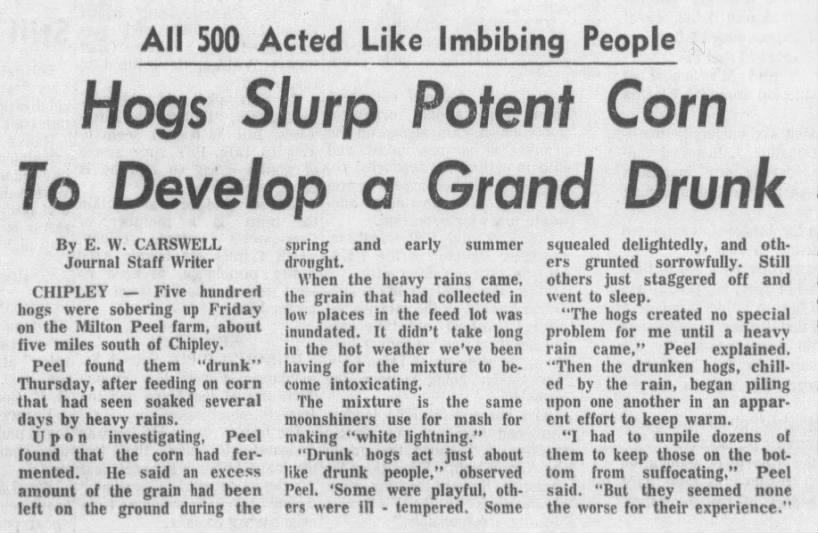Animals
Voluntary Alcohol Consumption in Chimpanzees and Orangutans
A study published in the June 1968 issue of the Quarterly Journal of Studies on Alcohol involved giving chimpanzees and orangutans as much vodka (mixed with fruit juice) as they wanted to drink in order to find out if they'd become alcoholics.Reportedly the chimpanzees were enthusiastic drinkers and became drunk repeatedly. But oddly, the orangutans, although they drank, never showed any signs of intoxication.
I'm curious to know more details about the study, but unfortunately the article itself is locked behind a paywall.


Central New Jersey Home News - Aug 22, 1968
Posted By: Alex - Wed Jun 05, 2024 -
Comments (1)
Category: Animals, Inebriation and Intoxicants, Experiments, 1960s
Mrs. Wilmer Steele’s broiler house
In 1974, Mrs. Wilmer Steele's broiler house was added to the National Register of Historic Places. It has the distinction of being the only chicken coop included in the Register.
Mrs. Wilmer Steele's broiler house, located at the University of Delaware Substation near Georgetown, Delaware
The documentation shows that the folks responsible for maintaining the Register were reluctant to add a chicken coop. They initially rejected the application. But finally they were won over, convinced by the argument that it was in Mrs. Wilmer Steele's chicken coop that the modern broiler industry (i.e. breeding chickens for meat rather than for eggs) began.
More info from Wikipedia:

"Ike Long, a broiler caretaker, two of the Steele children and Mrs. Wilmer Steele in front of a series of colony houses during the pioneering days of the commercial broiler industry."
Posted By: Alex - Mon Jun 03, 2024 -
Comments (1)
Category: Animals, Farming, Landmarks
The Dancing Pig
Posted By: Paul - Sat May 25, 2024 -
Comments (0)
Category: Animals, Anthropomorphism, 1900s, Dance, Love & Romance
Arrow Storks
Arrow storks (in German Pfeilstörche) are storks that got arrows stuck in their body while wintering in Africa but nevertheless managed to fly back to their summer habitats in Europe. To date, around twenty-five Pfeilstörche have been documented.From wikipedia:

Image & text: Overlooked Sights. German Places. By Michaela Vieser and Reto Wettach.

Posted By: Alex - Mon May 20, 2024 -
Comments (1)
Category: Animals, Science
The doctor who made rats go insane
Dr. Norman Maier is pretty much unknown today, but Wikipedia notes that his research "received extensive publicity in its day." That research involved making rats go insane.


The cause of man's mental suffering identified: not being given his breakfast promptly at 7 am.
Thus a man who is "conditioned" to expect his breakfast promptly at 7 o'clock in the morning and does not get it may develop a nervous disorder if his wife fails to provide it at that time for many mornings in succession.

Detroit Free Press - Jan 1, 1939
Posted By: Alex - Mon May 13, 2024 -
Comments (2)
Category: Animals, Psychology, 1930s
Crazy Yogi

Posted By: Paul - Sat May 04, 2024 -
Comments (0)
Category: Animals, Anthropomorphism, Music, Cartoons, 1960s
The Language and Music of the Wolves
Don't play this while your dog is listening!The first video is Redford's speech; the second is the calls.

Posted By: Paul - Wed Apr 03, 2024 -
Comments (1)
Category: Animals, Vinyl Albums and Other Media Recordings, 1970s, Cacophony, Dissonance, White Noise and Other Sonic Assaults
Drunken Hog Pile
Intoxicated animals is a favorite WU theme, going back, I think, to entries in Chuck Shepherd's NOTW.

Posted By: Paul - Sat Mar 16, 2024 -
Comments (0)
Category: Animals, Inebriation and Intoxicants, 1960s, Alcohol
RIP Pigcasso
The artist's Wikipedia page.
Posted By: Paul - Fri Mar 08, 2024 -
Comments (2)
Category: Animals, Art, Obituaries, Africa, Natural Wonders
Funeral March on the Death of a Parrot
Read about the eccentric, parrot-loving composer Charles-Valentin Alkan (and his equally eccentric son) here.
Posted By: Paul - Thu Feb 08, 2024 -
Comments (1)
Category: Animals, Eccentrics, Music, Europe, Nineteenth Century

| Who We Are |
|---|
| Alex Boese Alex is the creator and curator of the Museum of Hoaxes. He's also the author of various weird, non-fiction, science-themed books such as Elephants on Acid and Psychedelic Apes. Paul Di Filippo Paul has been paid to put weird ideas into fictional form for over thirty years, in his career as a noted science fiction writer. He has recently begun blogging on many curious topics with three fellow writers at The Inferior 4+1. Contact Us |




